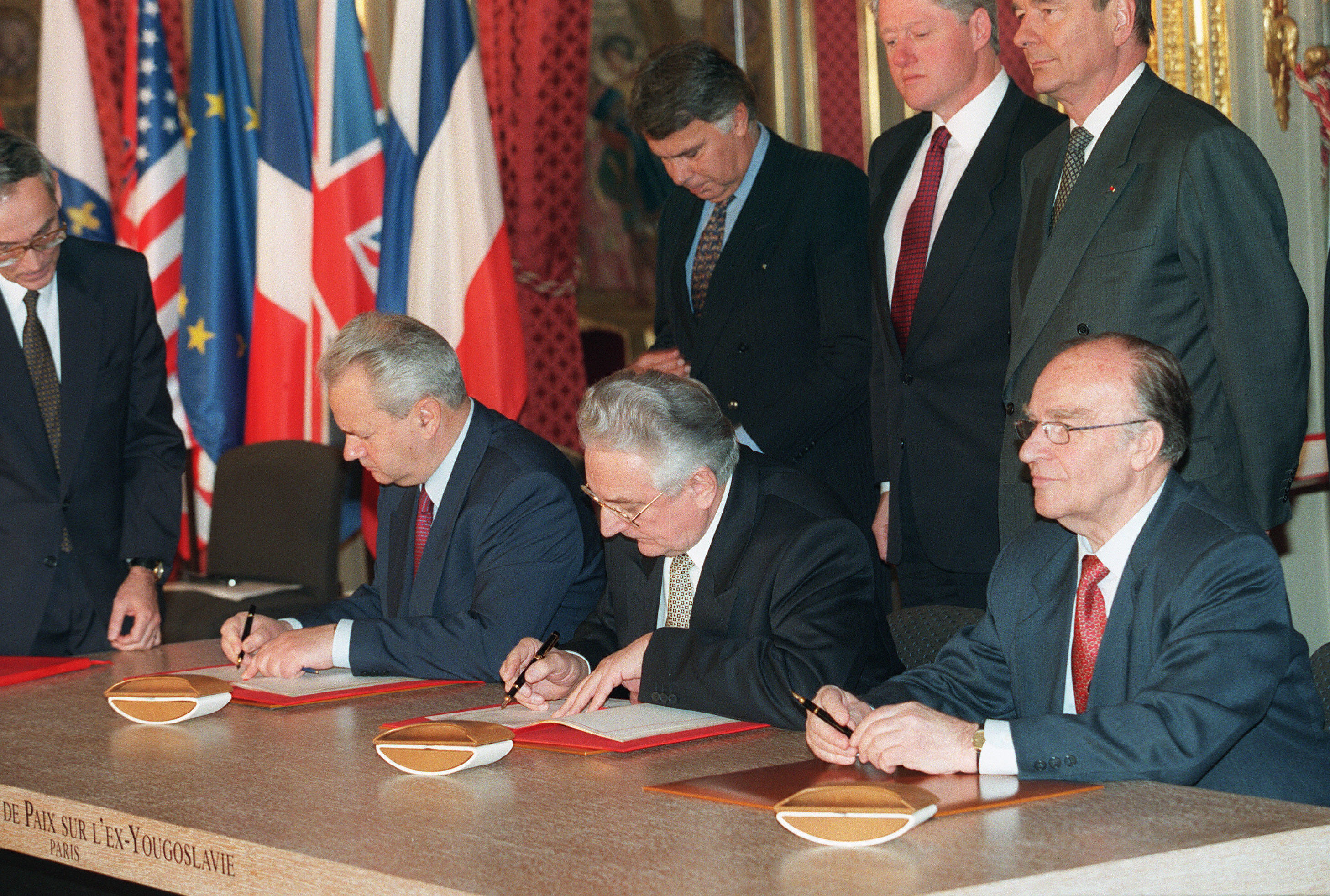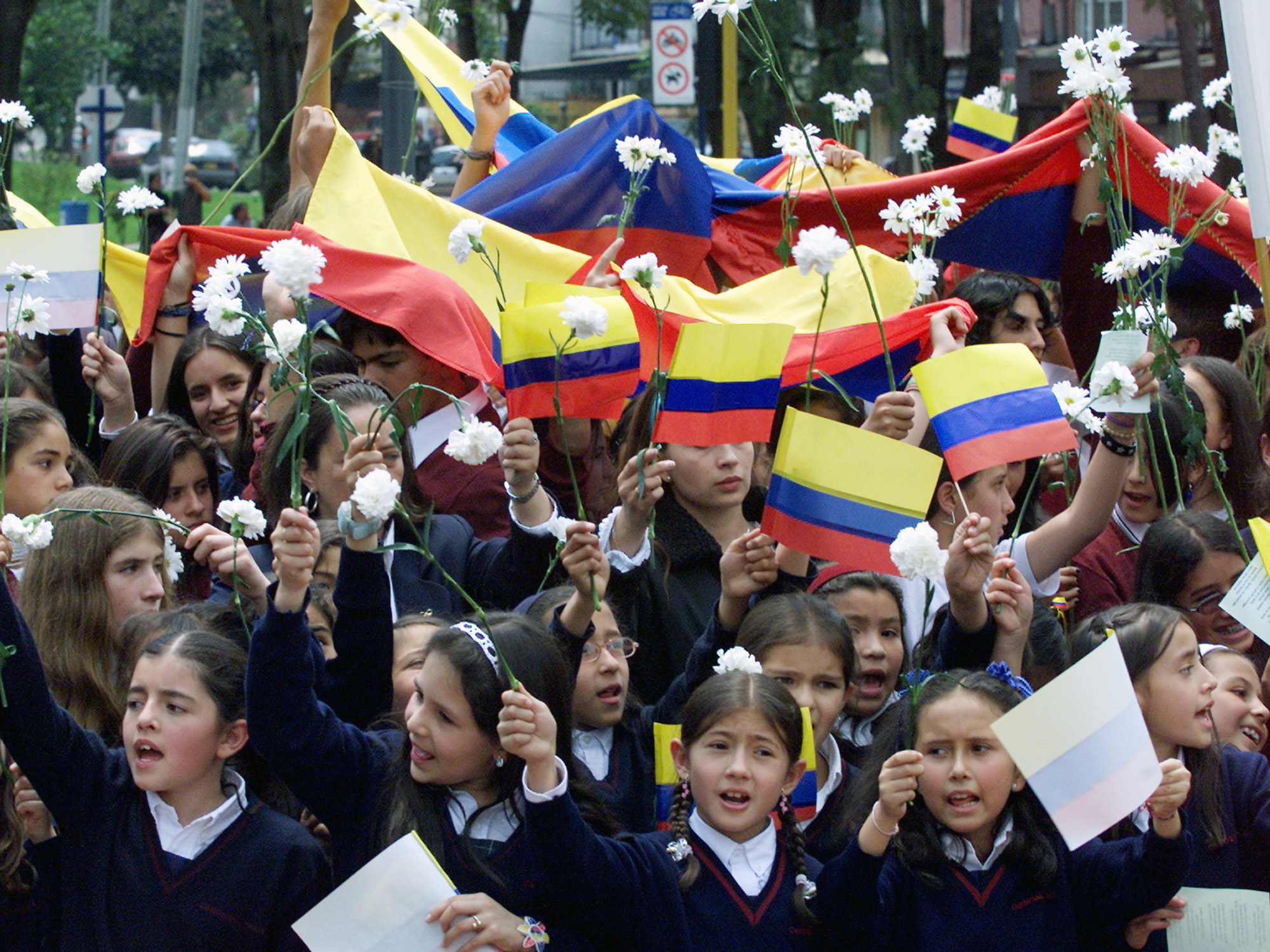
Paris, FRANCE: (FILES) This file picture taken 14 December 2005 at the Elysee Palace in Paris (MICHEL GANGNE/AFP/Getty Images)
By Christina V. Harris, Women’s Human Rights Coordination Group
“When will we learn that no peace can be sustainable and just without the active and meaningful participation of women?” said Gorana Mlinarević, Nela Porobić Isaković and Madeleine Rees, commenting on the lingering ethnic tensions and gender inequality in Bosnia and Herzegovina 20 years after the Dayton Peace Agreement was made. The Dayton agreement, which was formally mediated, negotiated, witnessed, and signed exclusively by men, is today thought by many to have been a failure.
The agreement came about at a time when just 11 percent of peace agreements included even a reference to women, and five years before the passing of the landmark United Nations Security Council Resolution 1325—the first UN resolution to acknowledge war’s unique, and too often unrecognized, impact on women and girls. Of immense significance, it was also the first resolution to urge UN Member States to increase the participation of women in conflict resolution and peacebuilding efforts—an official move away from the days of Dayton where only male leaders of warring parties were seen as acceptable contributors to peacemaking.
Today on the 16th Anniversary of Resolution 1325, there is still much progress to be made on women’s inclusion in peace and security efforts. During last year’s commemoration, Phumzile Mlambo-Ngcuka, Executive Director of UN Women, highlighted the resolution as “one of the crowning achievements of the global women’s movement and one of the most inspired decisions of the United Nations Security Council.” However, she lamented, “there remains a crippling gap between the ambition of our commitments and actual political and financial support.”

Students celebrating International Women’s Day hold Colombian flags and flowers during march to demand the release of dozens of kidnapped children, Bogota.
Just last week US Ambassador to the United Nations, Samantha Power, reiterated Mlambo-Ngcuka’s concern: “Don’t get me wrong,” she stated, “there has been, of course, genuine progress since Resolution 1325 was adopted” but “the gap between how men and women actually contribute to peace processes” remains. She noted a significant increase in gender-specific provisions in peace agreements since 2010 and a numerical increase in the number of women participating in official negotiations around the world in recent years. However, she concluded that it’s still ultimately men deciding on how to make peace, with women’s participation in peace processes too often viewed by those in charge as a box to be checked, if it’s checked at all.
At this very moment women in Syria, South Sudan, Yemen, and Afghanistan are calling for a seat at a peace table that fails to fully recognize the need for their participation. Here are five reasons why the international community must support their efforts:
- Women bring unique experiences and perspectives to peace negotiations – While most combatants are men and are more likely to be killed in combat, women play many roles during armed conflict, from victim to perpetrator, community peacemaker to household breadwinner. Women are more likely to be the targets of gender-based violence in war and to die from the indirect effects of armed conflict. They are also well-documented as being some of the most effective advocates for peace in their communities and countries. With different experiences during war, come different perspectives and priorities that must be addressed during peace negotiations—from sexual and gender-based violence to refugee rights to root causes of conflict. In fact, women, when included in talks, are known for not only advancing specific concerns facing women and girls, but advocating on behalf of other excluded groups to address vital human rights and recovery issues.
- A peace agreement is 35 percent more likely to last at least 15 years if women participate in its creation – Data shows that many peace deals appear successful in the short term only to fail in the long run. While data is still emerging on the impact of women’s inclusion in peace deals, a recent study of 40 peace processes in 35 countries over the last thirty years revealed that when women’s groups actively engage in a peace process, a peace deal is almost always reached. If they do not participate, the rate of reaching an agreement is much lower. It has also been shown that when women participate in peace processes, peace is more likely to last. According to Stone, when women are involved and included in peace processes “the peace agreement that results is 20 percent more likely to last at least two years.” And in the longer term, “an agreement is 35 percent more likely to last at least 15 years if women participate in its creation.”
- A strong peace accord doesn’t just end a war, it builds long term peace in a fragile society – Many male leaders have argued that the peace table has no need for women’s voices, particularly as women do not typically play significant roles in armed forces and groups. However, many advocates have rightly asserted that the aim of peacemaking isn’t just to end a conflict between warring parties, it’s to create a framework that will serve as a guide for a new, peaceful society. Any such framework cannot be considered legitimate if 50 percent of a society’s population is kept from contributing to its fabric.
- New constitutions and national action plans will have a better chance of being made with women’s human rights in mind – Because they are the building blocks of post-war reconstruction, peace agreements can “have a distinctive quasi-constitutional quality and sometimes even constitute or contain constitutions.” For this reason, these documents are more than just pieces of paper for moving forward, they have the power to deeply affect the laws and policies that govern a population. The peace table can therefore offer women and other minority groups a significant opportunity to advance their human rights and secure social, political, and economic gains that they might not have previously had under their former government structure.
Some have called Bosnia and Herzegovina’s peace deal “the peace that failed women.” According to women’s human rights activist Vildana Džekman, the result of excluding women during the Dayton process is still felt today. Džekman notes: “The division is deepening every year. Women are ignored in Bosnia and Herzegovina, since the constitution does not recognize them as through the guarantee of women’s rights. Wherever you scratch on the surface you find segregation, discrimination and marginalization. For example, maternity benefits differ between cantons, and in some there are none at all! I ask myself is a woman in Tuzla worth less than a woman in Sarajevo? According to this structure she is.”
- Equal inclusion in the peace process is a right in itself that must be recognized – Perhaps we should have started and ended here. However, while we wish this were a given, provided the slow progress made on 1325, the UN Women’s Global Study on the Implementation of Resolution 1325 recently reminded the world community that “it must not be forgotten that resolution 1325 was conceived of and lobbied for as a human rights resolution that would promote the rights of women in conflict situations. Any policy or programme on women, peace and security must be conducted with this in mind.”
As we struggle for women’s equal participation, we must remember that a seat at the peace table is not enough. Once women get to the table, they will inevitably face additional barriers, including male colleagues who are resentful of their presence and eager to shut their perspectives down. This fight will be a long one, and the next step, as articulated by Ambassador Power, is doing “more to promote not mere participation, but meaningful, effective participation, with a stress on the word effective.”
Amnesty has joined partner organizations calling on the US government to codify a US National Action Plan (NAP) on Women, Peace, and Security. We continue to work with partners to push the US government to fulfill its commitments under the NAP, working to ensure that inclusive peace processes are institutionalized as part of US foreign policy priorities. Stay tuned for more information on this during the next administration.
We respect the role played by the UN for international safety and peace. They also play a major role in development of an economy. At, Granger Auto Detail & Hand Car Wash, http://www.elkhartautodetailing.com/ and various other businesses we have seen the development of business through various international policies.